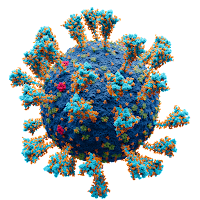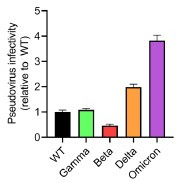Scientists are very interested in the omicron variant and why it is so dangerous. Since vaccinated people are getting infected, it must mean that the omicron variant isn't effectively neutralized by vaccine-induced antibodies. Several preprints on this topic have been posted and they all reach the same conclusion. I'll discuss one of them.
Garcia-Beltran, W.F., St Denis, K.J., Hoelzemer, A., Lam, E.C., Nitido, A.D., Sheehan, M.L., Berrios, C., Ofoman, O., Chang, C.C. and Hauser, B.M. (2021) mRNA-based COVID-19 vaccine boosters induce neutralizing immunity against SARS-CoV-2 Omicron variant. medRxiv. doi: 10.1101/2021.12.14.21267755
Recent surveillance has revealed the emergence of the SARS-CoV-2 Omicron variant (BA.1/B.1.1.529) harboring up to 36 mutations in spike protein, the target of vaccine-induced neutralizing antibodies. Given its potential to escape vaccine-induced humoral immunity, we measured neutralization potency of sera from 88 mRNA-1273, 111 BNT162b, and 40 Ad26.COV2.S vaccine recipients against wild type, Delta, and Omicron SARS-CoV-2 pseudoviruses. We included individuals that were vaccinated recently (<3 months), distantly (6-12 months), or recently boosted, and accounted for prior SARS-CoV-2 infection. Remarkably, neutralization of Omicron was undetectable in most vaccinated individuals. However, individuals boosted with mRNA vaccines exhibited potent neutralization of Omicron only 4-6-fold lower than wild type, suggesting that boosters enhance the cross-reactivity of neutralizing antibody responses. In addition, we find Omicron pseudovirus is more infectious than any other variant tested. Overall, this study highlights the importance of boosters to broaden neutralizing antibody responses against highly divergent SARS-CoV-2 variants.
This is an Amerian study so the authors looked at three different vaccines: Pfizer (BNT162b2), Moderna (mRNA-1273), and Johnson & Johnson (Ad26.COV2.S). For each vaccine they examined four different groups: (1) people who have received their full dose within the last three months, (2) people who had been vaccinated 6-12 months ago, (3) people who had been vaccinated at least six months ago but had subsequenty gotten infected with SARS-CoV-2, and (4) people who got a vacine booster shot within the past three months.
They isolated serum from every individual in the 12 groups and challenged them with a pseudovirus containing the spike protein from the WT variant (Beta?), the Delta variant, and the Omicron variant. What they're measuring is neutralization, or the ability of the antibodies in the serum to inactivate the virus so that it can no longer infect cells. The results are shown below.
Let's look at the top graphs (red) for the Moderna vaccine. You can see that if the vaccination was given recently (< 3 months), the antibodies do a good job of neutralizing the WT virus although there's considerable variation from individual to individual. It does less well with Delta and much less well with Omicron.
The results are more striking for people who were vaccinated more than six months ago. Neutralization of all three variants is much lower because antibody production wanes after a few months [On the effectiveness of vaccines]. Serum from this group cannot neutralize the Omicron variant—in other words omicron has evolved to escape neutralization from people who were vaccinated more than six months ago.
Omicron is neutralized fairly well in the group that had been infected after getting the vaccine. That's because their antibody levels were boosted by the infection. Similarly, people who got a vaccine boost also had high enough antibody levels to neutralize Omicron. The boost works better than getting COVID-19 but that may just be because the boosts were given more recently than the average infection.
Similar results were obtained for the Pfizer vaccine (red) and the Johnson & Johnson vaccine (green) except that the J & J vaccine gave poorer neutralization in all cases.
What this shows is that the initial vaccinations aren't very effective at blocking infection so vaccinated people will get infected. The amount of antibodies in the serum will rise after the initial infection because the memory B cells and memory T cells will be activated so these people will eventually fight off the infection and most of them will not suffer severe effects. This is because the Omicron variant cannot evade higher levels of antibodies and also because cellular and innate immunity are a bit different than antibodies alone.
The strange result is that after a booster shot the neutralization of Omicron relative to Delta is higher than before the booster shot. This suggests that the third dose of antigen in the vaccine is capable of eliciting additional antibodies that weren't stimulated in the first two doses. (These are polyclonal antibodies. There are many different antibodies to different parts of the spike protein. Everyone has a slightly different antibody profile and nobody has a complete repertoire of all the possible antibodies.)
As I mentioned above, this is just one of several studies that show the same result. Omicron can evade neutralization in people who have been vaccinated so they will develop mild symptoms and spread the virus until their secondary defenses are sufficient to stop the infection. Getting a booster will help keep Omicron under control.
The fact that vaccinated people can help spread the virus is one of the reasons why the Omicron wave will be significant and deadly. However, in addition, the Omicron variant is more infectious than Delta and much more infectious than previous variants. The authors observed this in their experiments when they tested for neutralization by seeing if the viruses could infect cells in culture. Omicron is 2× more infectious than Delta and this is another reason why the Omicron wave will be dangerous.
The reasons for the increased infectivity are not known at present. About a dozen papers/preprints have been published but some of the results are contradictory. For example, modeling of the interaction of spike protein and the ACE2 receptor has shown increased binding in some papers but other papers refute this claim by showing that they didn't take into account the mutations that reduce binding. There's a suggestion that the efficiency of cleavage at the furin cleavage site is enhanced in the Omicron variant but this has not been confirmed. Some scientists have speculated that changes in the glycosylation pattern of spike protein will enhance uptake of the virus and others point to changes in a helical bundle that will probably cause the virus to enter cells more readily.
We'll have to wait and see why infectivity is higher in the Omicron variant and also why transmissibility seems to be higher (higher viral load?). Meanwhile, one thing is clear. Booster shots are important to keep this variant under control. The bad news is that the effect of the booster in producing antibodies is likely to diminish over time so that after six months or so the levels of antibodies might not be sufficient to neutralize Omicron and additional boosters will be necessary (or an Omicron-specific mRNA vaccine.) People (mostly American) who got their booster shot several months ago may not be as protected as they think.
Some of the problems with this study are similar to the problems with the studies out of Israel. Many countries have spaced out their first and second vaccination doses to several months instead of 4-6 weeks as in Israel and the USA. The strategy followed in other countries may lead to higher antibody levels than those shown in this study. Also, in most other countries the AstraZenica vaccine has been widely employed and the Johnson & Johnson vaccine is not approved. Furthermore, a significant number of people in those other countries have received mixed vaccine doses (e.g. AstraZenica + an mRNA vaccine) and this is known to be beneficial. It would be nice to see a similar study from Canada or the UK.



Trivial question: Is "wild type" the same as Alpha? Something I read recently seemed to imply distinguish between them.
ReplyDeleteMore importantly: What do you know about the idea that pathogens evolve towards relative benignity? What little I could find suggested that it depends on how many susceptible hosts are available (many->virulence, few->benignity, for reasons which make sense to my limited understanding of the subject). There seems to be a (possibly false) hope circulating that Omicron represents the first step towards benignity.
I just answered my first question, at Wikipedia of all places: https://en.wikipedia.org/wiki/SARS-CoV-2_Alpha_variant.
DeleteAlpha is B.1.1.7, a.k.a. the UK variant.
I checked the paper again and I can't find any reference to the Alpha variant. I thought I had seen that this was their WT. I did find several references to the Beta variant (B.1.351) although they don't say that this is their WT strain. I think it is so I've edited my post.
Delete